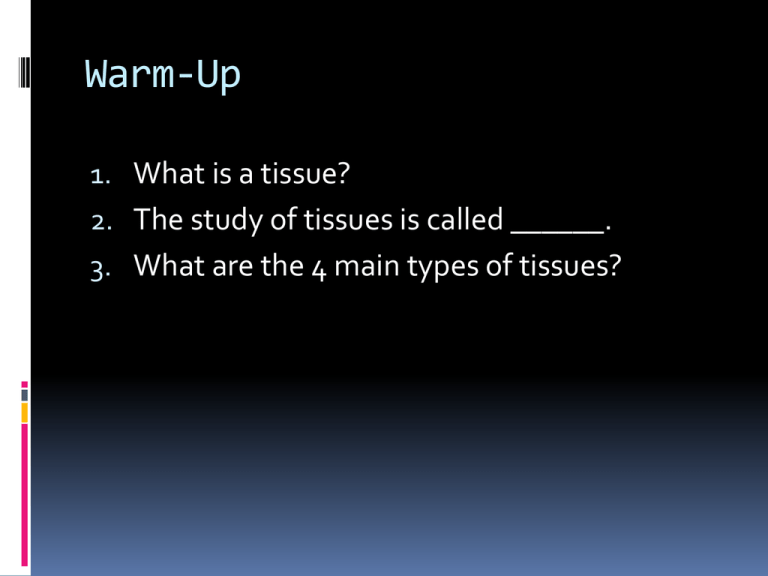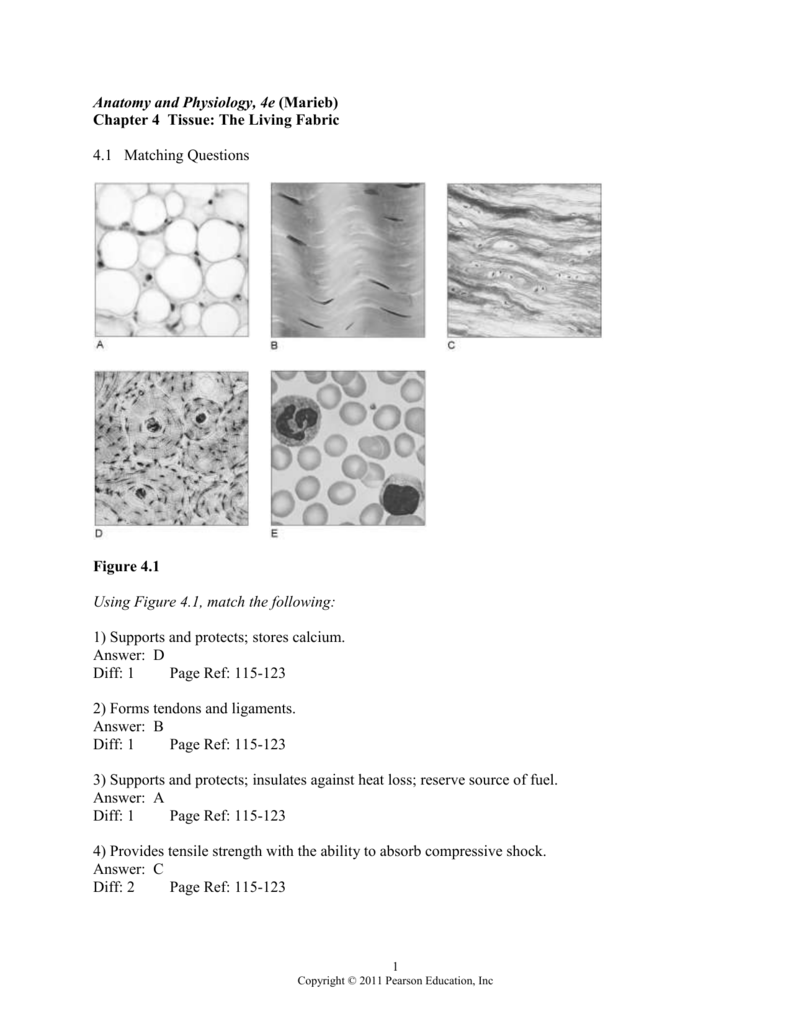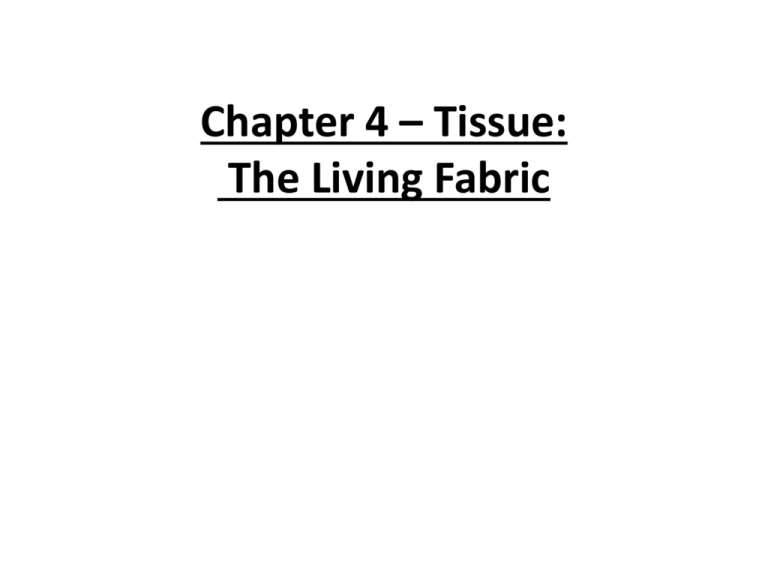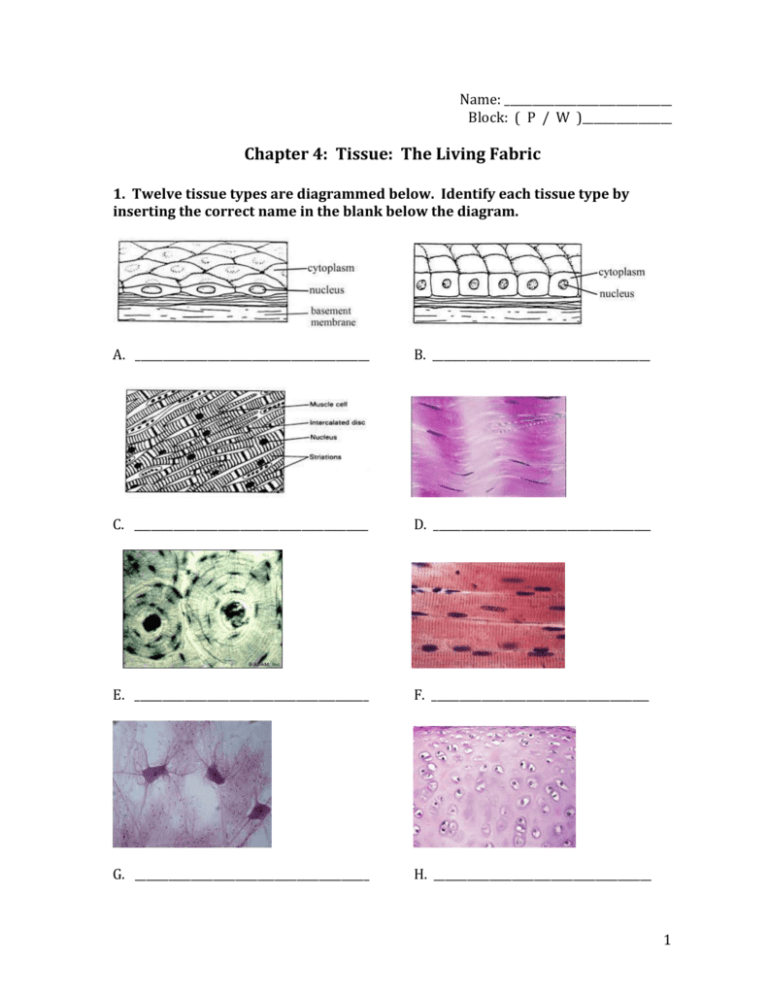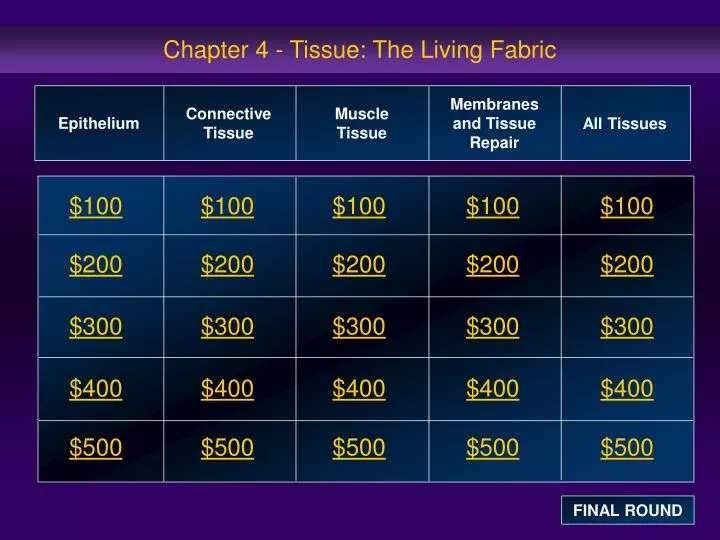Chapter 4 Tissue The Living Fabric Answers
Chapter 4 Tissue The Living Fabric Answers - Tissues provide specific functions for the body and there are four main types of tissues: Web you observe a tissue that has cells of varying heights. Hematopoietic stem cells for blood (produce blood cells but isnt located in that tissue white blood cells defensive mobile. What is the function of muscular tissue. The living fabric connective tissue connective tissue is the most abundant and widely distributed of 📚 dismiss try ask an expert There are four basic types of tissue are present in the human body these includes epithelial, connective, muscular, and nervous tissue. Designed to perform a specialized function primary tissue types: The living fabric notes chapter part tissue: What classification would you give to this epithelial tissue? Reeves human anatomy & physiology 1.
The living fabric connective tissue connective tissue is the most abundant and widely distributed of 📚 dismiss try ask an expert What is the function of. Epithelial, connective, muscle, and nervous tissue. Designed to perform a specialized function primary tissue types: What is the function of connective tissue. Epitheial tissue, connective tissue, muscle tissue, and nerve tissue. Web you observe a tissue that has cells of varying heights. Type your answers in the spaces provided below. •understanding types of tissues allows you to monitor potential tissue damage, such as bedsores, in patients. Web learn test match created by k06oc01 terms in this set (110) what are the types of tissues that are in the body?
Overview of body tissues a. Collagen fibers, and collagen sheets. Designed to perform a specialized function primary tissue types: Identify the term that does not belong in each of the. What classification would you give to this epithelial tissue? There are four basic types of tissue are present in the human body these includes epithelial, connective, muscular, and nervous tissue. Epithelial, connective, muscle, and nervous tissue. Epitheial tissue, connective tissue, muscle tissue, and nerve tissue. What is the function of connective tissue. At first glance, it appears that the tissue has multiple cell layers, but upon closer investigation you see that all of the cells attach to the same basement membrane.
Tissue The Living Fabric
Web use the key to classify each of the following described tissue types into one of the four major tissue categories. Tissues provide specific functions for the body and there are four main types of tissues: Tissues provide specific functions for the body and there are four main types of tissues: Hematopoietic stem cells for blood (produce blood cells but.
Chapter 4 Tissue The Living Fabric Study Guide Answer Key Study Poster
Tissues provide specific functions for the body and there are four main types of tissues: Designed to perform a specialized function primary tissue types: Web you observe a tissue that has cells of varying heights. What is the function of connective tissue. The living fabric connective tissue connective tissue is the most abundant and widely distributed of 📚 dismiss try.
Chapter 4 Tissue The Living Fabric Answers MyleyLayseigh
Click the card to flip 👆. Type your answers in the spaces provided below. Web regenerative germinative cells (stem cells) chapter 4: Fibroblasts in conn tissue proper 2. Epitheial tissue, connective tissue, muscle tissue, and nerve tissue.
Chapter 4 Skin And Body Membranes Worksheet Answers Worksheet List
What does epithelial tissue do?. Click the card to flip 👆. What classification would you give to this epithelial tissue? Web lining, covering, and glandular tissue. Fibroblasts in conn tissue proper 2.
Chapter 4 The Tissue Level Of Organization Study Guide Answers Study
Web regenerative germinative cells (stem cells) chapter 4: Designed to perform a specialized function primary tissue types: What is the function of connective tissue. What does epithelial tissue do?. What is the function of muscular tissue.
Chapter 4 Tissue The Living Fabric Epithelium Cartilage
(a) connective tissue (b) enithelium (c) muscle (d) nervous tissue _____(1) tissue type composed. Identify the term that does not belong in each of the. Under the skin under the subcutaneous tissue, eyeball, abdomen, and in breasts. The living fabric test bank. 8 answer the four important functions of epithelial tissues are to physically protect the body from the outside.
Chapter 4 * Tissue The Living Fabric
Tissues provide specific functions for the body and there are four main types of tissues: What does epithelial tissue do?. Epitheial tissue, connective tissue, muscle tissue, and nerve tissue. The living fabric notes chapter part tissue: Reeves human anatomy & physiology 1.
Chapter 4 Homework Packet
Under the skin under the subcutaneous tissue, eyeball, abdomen, and in breasts. Hematopoietic stem cells for blood (produce blood cells but isnt located in that tissue white blood cells defensive mobile. What does epithelial tissue do?. Overview of body tissues a. Web you observe a tissue that has cells of varying heights.
Chapter 4 Tissue The Living Fabric Answers MyleyLayseigh
What classification would you give to this epithelial tissue? Tissues provide specific functions for the body and there are four main types of tissues: What is the function of muscular tissue. A group of cells similar in structure; Designed to perform a specialized function primary tissue types:
PPT Chapter 4 Tissue The Living Fabric PowerPoint Presentation
Tissues provide specific functions for the body and there are four main types of tissues: Designed to perform a specialized function primary tissue types: There are four basic types of tissue are present in the human body these includes epithelial, connective, muscular, and nervous tissue. What is the function of muscular tissue. Reeves human anatomy & physiology 1.
What Does Epithelial Tissue Do?.
Epithelial, connective, muscle, and nervous tissue. A group of cells similar in structure; Designed to perform a specialized function primary tissue types: Under the skin under the subcutaneous tissue, eyeball, abdomen, and in breasts.
Tissues Provide Specific Functions For The Body And There Are Four Main Types Of Tissues:
Identify the term that does not belong in each of the. Hematopoietic stem cells for blood (produce blood cells but isnt located in that tissue white blood cells defensive mobile. Overview of body tissues a. What is the function of connective tissue.
Tissues Provide Specific Functions For The Body And There Are Four Main Types Of Tissues:
There are four basic types of tissue are present in the human body these includes epithelial, connective, muscular, and nervous tissue. Epitheial tissue, connective tissue, muscle tissue, and nerve tissue. Click the card to flip 👆. Type your answers in the spaces provided below.
Fibroblasts In Conn Tissue Proper 2.
At first glance, it appears that the tissue has multiple cell layers, but upon closer investigation you see that all of the cells attach to the same basement membrane. Location & type of fibers of reticular connective tissue. •understanding types of tissues allows you to monitor potential tissue damage, such as bedsores, in patients. (a) connective tissue (b) enithelium (c) muscle (d) nervous tissue _____(1) tissue type composed.
